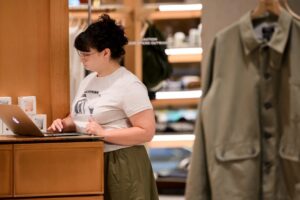
In the country Victorian town of Hamilton, nearly 300 kilometres west of Melbourne, a group of men meet in their local pub once a month to talk about the latest novel they are reading.
Farmer Jack Kennedy, who formed the Hamilton branch of the Tough Guy Book Club nearly five years ago, grew up feeling like it was not normal for men to read books.
“[Fiction] is a great way to build empathy in men, when they’re reading through someone else’s eyes,” Mr Kennedy said.
“It’s a really important thing for men’s mental health.”
But according to data collected by the Australian Bureau of Statistics (ABS) that was published last year, Australians are reading less.
That was especially true for men.
Gender gap in reading
Tough Guy Book clubs were started by Melburnian Shay Leighton 13 years ago with the aim of getting men to “read more, talk more, and have more friends”.
“It just really builds great connections among men,” Mr Kennedy said, as a tractor hummed in the background.
“Which I think is something that we’re really desperate for at the moment with a lot of the political things going on and the way that we currently interact socially with social media.”
But growing up there was a social norm “where you didn’t want to be known as someone who reads books”, he said.
That is borne out by the ABS data, although it hints at a broader decline in reading, despite Aussies having more leisure time than ever before.
The population cohort that read the least was males aged 15–24, with only 10.1 per cent reading on any given day, according to the ABS.
While Gen Z teenage girls and young women were not far ahead, the data showed females, on average, were reading more than males across all age groups.
Nearly one in four Generation X females (23 per cent) participated in reading compared to about one in eight Generation X males (12 per cent).
Anna Burkey, president of book industry initiative Australia Reads, which aims to get more people reading, said part of the problem was boys and men did not see themselves reflected in the reading world.
Anna Burkey says the gender gap in reading comes from men not seeing themselves as readers. (Supplied: Anna Burkey)
“If you see people around you regularly doing something, you want to do it,” Ms Burkey said.
“If you see fewer men and boys [reading] then you think to yourself, ‘Well, maybe that’s not for me because I do not see myself reflected’.”
According to Ms Burkey, 29 per cent of Australian senior school students did not read or listen to a book at all in the previous 12 months, a 7 per cent increase on a previous study.
Australia Reads says well-funded school libraries are part of the solution to get younger people reading more. (ABC News: Rebecca Carmody)
“We’re not just seeing people not reading for themselves … we’re seeing people not reading to their children as much and that they are less likely to read to boys than to girls,” she said.
“So this pattern is being reinforced very unconsciously.”
Ms Burkey said she would like to see more dads reading to their children to set a positive example.
Worrying decline
Award-winning Victorian author Jock Serong said being read to as a child made an impact.
Jock Serong says some days he feels his profession is heading towards extinction. (Supplied: Jo O’Keefe)
“I was one of those kids who was lucky enough to be read to very, very heavily by my parents,” Serong said.
Serong said the decline in reading worried him.
“Everyone in the world of books is fighting a rearguard action for survival,” he said.
“We’re all driven at an absolutely astonishing pace by media and social media, and we don’t do enough reflecting.
“We are overwhelmed with information and we are starved of contemplation.”
Preventable reading ‘tragedy’
Serong said while reading was a form of meditation and comfort, it could extend so much further to everyday life.
“[Not reading] means that we don’t see the patterns in things, we don’t see the human behaviours that keep repeating in politics and public life because we’re not doing the deep, slow thinking and books are vital to the deep, slow thinking.”
Why does this matter?
Ms Burkey said a 2015 study showed that people who read regularly were 58 per cent more empathetic, which she believed could have a “knock-on effect” for tolerance, social cohesion and democracy.
“Reading is proven to help you understand your place in the world, to walk in other people’s shoes,” she said.
Reading is considered to have wide-ranging benefits. (ABC News: Tom Joyner)
Ms Burkey said it could also have economic and social impacts, and even health benefits.
“Australia has a literacy problem,” she said.
“Forty-four per cent of Australians struggle with literacy, which is fairly similar to some other Western nations, but a pretty shocking number given how wealthy Australia is.”
“Reading brings down your blood pressure, it slows your heart rate, it calms you down and it allows focus and concentration in a world where our attention spans are getting ever more fragmented.
“So reading allows us to have more focus and concentration and if you read regularly, you’re more likely to sleep better at night.”
Home reading tips
Ms Burkey said Australia needed a national strategy for reading that reminded people of the fun, comfort, entertainment and inspiration reading could bring.
“Reading for pleasure as a child is one of the biggest indicators of future success as an adult, and spending time reading increases empathy, while helping us feel less anxious,” she said.
“Given the high anxiety rates amongst younger Australians growing up in a tumultuous world, reading offers the opportunity to relax, focus and ground ourselves for a while.”





